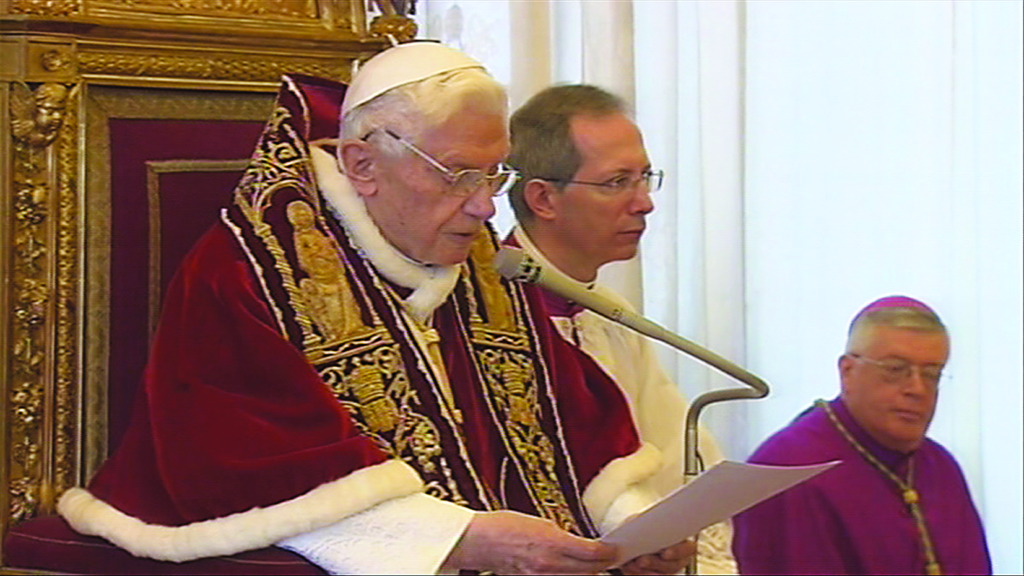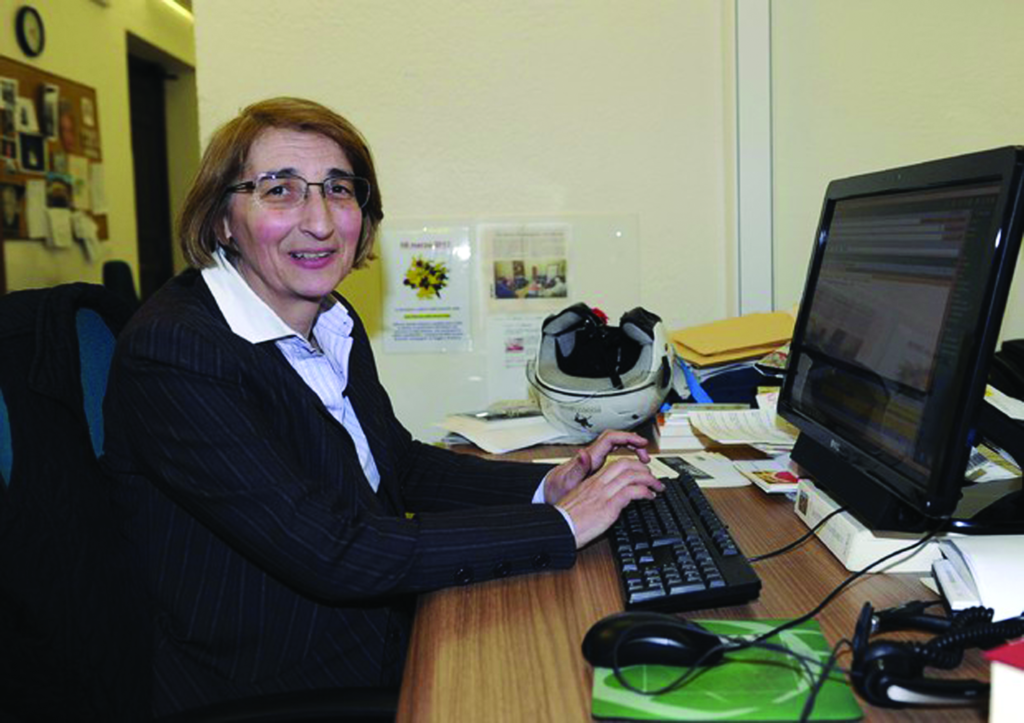What did it really say in Latin?
By John Byron Kuhner

Vatican, February 11, 2013. At the conclusion of a meeting regarding canonizations, Pope Benedict XVI read a prepared speech in Latin.
The most significant recent historical event to be conducted entirely in Latin took place on February 11, 2013. It was undoubtedly odd. Pope Benedict XVI, at the conclusion of a canonization meeting, took out two sheets of paper and read a prepared speech in Latin. Its contents were sensational. In the consistory of cardinals — who should have understood at least some of his speech — there was no noticeable reaction at all. When the Pope had finished, Cardinal Angelo Sodano, Dean of the College, stepped to the microphone and expressed his bewilderment at the announcement and began reflecting on the journey of Benedict’s pontificate, but still, the room was stony and silent. Benedict himself, never very animated, looked like he was falling asleep. But Giovanna Chirri, a journalist for ANSA (an Italian news agency), watching the event on closed-circuit television, called in to her editors to break the story: “The Pope has resigned!” Her high school Latin was just enough to puzzle out what had happened, and Sodano’s words — he called it a “bolt out of the blue” (fulmine a ciel sereno) — confirmed it. The story went round the world in minutes.
The speech is worth investigating in full, especially because of the controversy Benedict’s resignation continues to generate. The text in Latin is widely available online, along with both audio and video. It’s only 251 words, and makes a great Latin exercise.
First of all, the Latin – you can get a sense of Benedict’s Latin right from the beginning:
Fratres carissimi, non solum propter tres canonizationes ad hoc Consistorium vos convocavi, sed etiam ut vobis decisionem magni momenti pro Ecclesiae vitae communicem.
“Dearest brothers, I have called you to this consistory not only for three canonizations, but also so I may share with you a decision of great importance for the life of the Church.” Simple, direct. Benedict’s Latin never beats around the bush. It is overwhelmingly likely that he wrote this Latin himself. It bears no marks of the work of the Vatican’s Latin office, which writes far more elegantly and floridly, and no marks of Benedict’s more expansive, say-everything-and-go-on-for-a-while German style. The late Fr. Reginald Foster, who worked in the papal Latin office until 2010, lambasted Benedict’s Latin as “square” and “chunky.” I rather like Benedict’s Latin, but it’s certainly very straightforward. Textbooks tell you that Latin tends to put verbs at the end of clauses, so that’s where Benedict puts them. End of story.
The next sentence explains the situation:
Conscientia mea iterum atque iterum coram Deo explorata ad cognitionem certam perveni vires meas ingravescente aetate non iam aptas esse ad munus Petrinum aeque administrandum.
“Having before God examined my conscience over and over, I have come to the certain knowledge that my strength, due to the burdens of age, is no longer suitable for properly administering the Petrine office.”
This is a nod to Vatican II, though probably few people know the Council texts well enough to hear it. It is referring to the Council’s proclamation Christus Dominus, and its section on episcopal resignation:
Cum igitur pastorale Episcoporum munus tanti sit momenti tantaeque gravitatis, Episcopi dioecesani aliique in iure ipsis aequiparati, si, ob ingravescentem aetatem aliamve gravem causam, implendo suo officio minus apti evaserint, enixe rogantur ut, vel sua ipsi sponte vel a competenti Auctoritate invitati, renuntiationem ab officio exhibeant.
“Since the pastoral task [munus] of the bishops is of such importance and gravity, diocesan bishops and their legal equivalents, if they have become less suitable for fulfilling their duty [officium] due to the burdens of age or some other grave cause, are earnestly requested to proffer their resignation from the office [officium], either of their own accord or at the behest of the competent authority.”
How much the bishop of Rome is merely a bishop or the “legal equivalent” of one, is, of course, one of those endless Church questions, but it’s clear that here, Benedict is applying the logic of Christus Dominus to the papacy itself.

Italian Giovanna Chirri, a journalist for the ANSA news agency, watching the event on closed-circuit television. Her high school Latin was just enough for her to puzzle out what had happened, and she called in to her editors to break the story
Benedict goes on to say that he is aware that being Pope is not just about doing things; merely to pray and to suffer can be accomplishing your job. But, he says, the moment requires something more: in mundo nostri temporis … ad navem Sancti Petri gubernandam et ad annuntiandum Evangelium etiam vigor quidam corporis et animae necessarius est. “In the world of our age … a certain vigor of body and soul is also necessary for steering the bark of St. Peter and for announcing the Gospel.” And then the conclusion:
Quapropter bene conscius ponderis huius actus plena libertate declaro me ministerio Episcopi Romae, Successoris Sancti Petri, mihi per manus Cardinalium die undevicesima Aprilis bismillesimo quinto commissum renuntiare ita ut a die vicesima octava februarii bismillesimo tredecesimo, hora vicesima, sedes Romae, sedes Sancti Petri vacet et Conclave ad eligendum novum Summum Pontificem ab his quibus competit convocandum esse.
“Therefore, well aware of the seriousness of this action, in full liberty I declare that I resign the ministry of the bishop of Rome, of the Successor of St. Peter, entrusted to me through the hands of the Cardinals on the 19th day of April, 2005, with the result that, from the twenty-eighth day of February 2013 [see below], at the twentieth hour, the see of Rome, the See of St. Peter, will be vacant; and I declare that a Conclave to select a new highest pontiff needs to be convoked by those to whom the duty belongs.”
Things could hardly be clearer. But there is one problem. I hate to offer the conspiracy theorists fodder, but there is a mistake here. It is typical writerly policy in Latin, as in other languages, to write numerals in text (“2013”) in place of the words. The text Benedict was reading from probably had numerals — no problem for an old Curial hand like Benedict; his Latin numbers were good, and his Italian pronunciation of them quite admirable (he says “diundevicesimaprilis,” eliding his vowels as the Italians do). However, all those “-esimas” and “-esimos” tripped him up when he had to say “2013,” which in Latin is an ordinal number, the “twothousand-thirteenth” year. He reads the adjective form of thirteen (tredecim) as “tredicesimo,” a number which does not exist in Latin. (The correct form is tertio decimo.)
Now, the conspiracy theorists may tell you that this means the Pope’s resignation date was “twenty-tredicesimo” — a year which does not exist — and thus Benedict faked his abdication. Perhaps his brain had slipped into Italian for a moment, where “thirteenth” is — you guessed it — tredicesimo: the kind of mental imprecision that warranted his desire to resign in the first place. But I suspect that one Italian word does not invalidate the document!
As for people claiming there are Latin mistakes everywhere in the document, don’t believe them. There’s one mistake, and that’s it.
I’ve heard another conspiracy theory, that Benedict only resigned his “ministry” (ministerium) and not his “job” (munus), but, in the Latin, this is no valid distinction. A ministerium (look it up) is a rich, full word in Latin, meaning “the office or functions of a minister, attendance, service, ministry… an office, occupation, work, labor, employment, administration, etc.” Listed synonyms are officium and (there it is!) munus. Anyway, Benedict makes it clear that the result of this resignation is a vacancy in the See of Peter and a need for a conclave. He could not, in fact, have made it clearer.
It was certainly a momentous speech. At the time, it was thought that Benedict might be trying to create a useful new precedent, where his successors also would resign after a certain number of years, in order to avoid a similar spectacle to John Paul II’s long, difficult, public deterioration. Our current experience makes it clear, however, that the inherent unity of the Petrine office has been compromised by Benedict’s resignation. Having both a Pope and a living previous Pope is a problem – especially when one explicitly abrogates his predecessor’s actions. In losing this unity we have lost something important. I’m hoping that we will return to the old system, where the Pope serves for life, even if all he can do at the end is pray — and suffer — for us all. Sometimes, that is all we can ask of him.







Facebook Comments